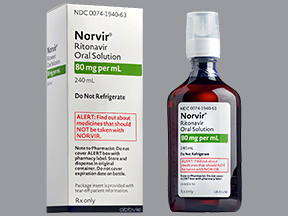RITONAVIR SOLUTION - ORAL
PHONETIC PRONUNCIATION: (rye-TAWN-uh-veer)
COMMON BRAND NAME(S): Norvir
GENERIC NAME(S): ritonavir
Uses
USES: This drug is used with other HIV medications to help control HIV infection. It helps to decrease the amount of HIV in your body so your immune system can work better. This lowers your chance of getting HIV complications (such as new infections, cancer) and improves your quality of life. Ritonavir belongs to a class of drugs known as protease inhibitors. It increases ("boosts") the levels of other protease inhibitors, which helps these medications work better. Because this solution contains other ingredients (alcohol and propylene glycol) that may cause side effects, it is not recommended for premature (pre-term) newborns right after birth or full-term newborns younger than one month of age, unless your doctor thinks it is right for your baby. Discuss the risks and benefits with your doctor. Ritonavir is not a cure for HIV infection. To decrease your risk of spreading HIV disease to others, do all of the following: (1) continue to take all HIV medications exactly as prescribed by your doctor, (2) always use an effective barrier method (latex or polyurethane condoms/dental dams) during all sexual activity, and (3) do not share personal items (such as needles/syringes, toothbrushes, and razors) that may have contacted blood or other body fluids. Consult your doctor or pharmacist for more details.
How to use RITONAVIR SOLUTION - ORAL
HOW TO USE: Read the Patient Information Leaflet provided by your pharmacist before you start taking ritonavir and each time you get a refill. If you have any questions, consult your doctor or pharmacist. Shake the bottle well before each dose. Take this medication by mouth with a meal, as directed by your doctor, usually 1 to 2 times daily. Take ritonavir at the same time(s) as your other protease inhibitor. Carefully measure the dose using a special measuring device/spoon. Do not use a household spoon because you may not get the correct dose. If you are using a feeding tube, ask your doctor or pharmacist if this medication may be given through your feeding tube. The dosage is based on your medical condition, response to treatment, and other medications you may be taking. Be sure to tell your doctor and pharmacist about all the products you use (including prescription drugs, nonprescription drugs, and herbal products). For children, the dosage may also be based on their body size. For the best effect, take this medication at evenly spaced times. To help you remember, take this medication at the same time(s) every day. It is very important to continue taking this medication (and other HIV medications) exactly as prescribed by your doctor. Do not take more or less of this drug than prescribed or stop taking it (or other HIV medicines) even for a short time unless directed to do so by your doctor. Skipping or changing your dose without approval from your doctor may cause the amount of virus to increase, make the infection more difficult to treat, or worsen side effects.
Side Effects
Precautions
Interactions
Overdose
Images
Reviews
Faq for RITONAVIR SOLUTION - ORAL
Ritonavir solution is primarily used to treat human immunodeficiency virus (HIV) infection. It is often used in combination with other antiretroviral medications to control the virus and slow down the progression of acquired immunodeficiency syndrome (AIDS).
Ritonavir belongs to a class of medications called protease inhibitors. It works by inhibiting an enzyme called protease, which is necessary for the replication of HIV. By blocking this enzyme, ritonavir helps to reduce the amount of virus in the body and allow the immune system to function more effectively.
Ritonavir solution is usually taken orally, with or without food. The dosage and frequency of administration will depend on the individual's specific condition and response to treatment. It is essential to follow the instructions provided by your healthcare provider or the medication label.
Common side effects of ritonavir solution may include nausea, vomiting, diarrhea, stomach pain, headache, weakness, and changes in taste. These side effects are usually mild and go away on their own. However, if they persist or become severe, it is important to consult a healthcare professional.
Ritonavir solution may interact with other medications, including both prescription and over-the-counter drugs. It is crucial to inform your healthcare provider about all the medications you are taking before starting ritonavir. Ritonavir may also have specific precautions for individuals with liver or kidney problems, certain heart conditions, or a history of certain conditions. Your healthcare provider can help determine if ritonavir is safe for you.
No, ritonavir solution is not a cure for HIV or AIDS. It is only effective in slowing down the progression of the disease and managing the symptoms. It is crucial to continue taking ritonavir and other prescribed antiretroviral medications as directed by your healthcare provider to maintain viral suppression and prevent drug resistance.
Warning
WARNING: Ritonavir may interact with many different types of medicines, in some cases causing severe (sometimes fatal) reactions. Consult your doctor or pharmacist about which medications should not be taken with ritonavir. (See also Drug Interactions section.)
Disclaimer
IMPORTANT: HOW TO USE THIS INFORMATION: This is a summary and does NOT have all possible information about this product. This information does not assure that this product is safe, effective, or appropriate for you. This information is not individual medical advice and does not substitute for the advice of your health care professional. Always ask your health care professional for complete information about this product and your specific health needs.

No Reviews Yet